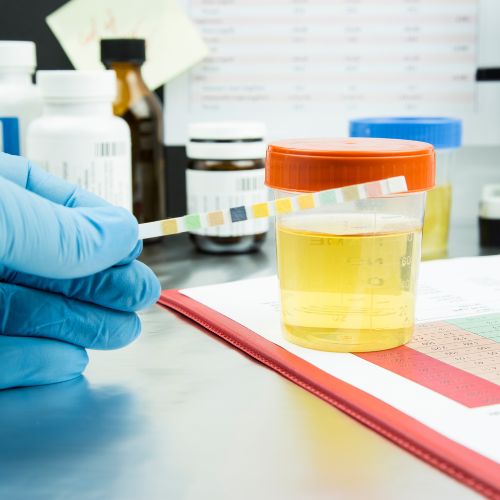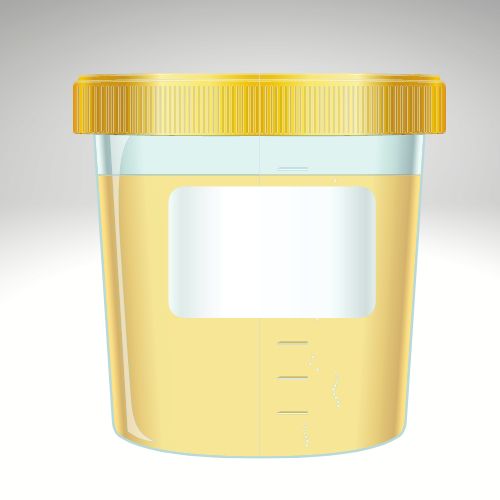Can Dehydration Cause Blood in Urine? What is the link?
Our content is not intended nor recommended as a substitute for medical advice by your doctor. Use for informational purposes only.
One of the main functions of your kidney is to maintain fluid balance. So, any excess fluid will increase urine amounts, and dehydration usually results in scanty, concentrated urine.
Dehydration is NOT listed as a direct cause of blood in the urine (hematuria). However, it may contribute to other conditions, such as UTI and exercise-induced hematuria leading to the appearance of blood in the urine.
I will guide you in this article about the possible links between dehydration and hematuria (blood in urine).
Dehydration is not directly linked to Hematuria.
There is no solid evidence that dehydration leads directly to blood in the urine (hematuria). However, some theories and small studies linked dehydration to diseases that cause hematuria, such as kidney stones and exercise-induced hematuria.
If you are experiencing hematuria or traces of blood in urine after being dehydrated, you must exclude the common causes of hematuria first.
Dehydration may make your urine scanty and concentrated (deep yellow). The concentrated urine is often more irritating as it contains higher concentrations of minerals and toxins and stays in your bladder longer.
So, it may irritate your urinary bladder, but it doesn’t typically cause blood in the urine in a healthy person. Concentrated urine may trigger blood in urine in patients with pre-existing conditions such as UTI, urinary tract stones, or bladder inflammation for any reason.
Main causes of hematuria & How it is linked to dehydration.
- Kidney stones: Stones are one of the major causes of hematuria (bloody urine). Also, chronic dehydration/drinking insufficient fluids are linked to developing stones, which in turn causes blood in the urine.
- Exercise-induced hematuria: Prolonged running, exercise, or vigorous contact sports are common causes of hematuria. Most experts believe blood in urine is due to trauma of the urinary bladder or kidneys and dehydration. It is a self-limiting condition that typically improves within a few days.
- Urinary Tract Infections (UTIs): Urinary tract infections of the bladder (cystitis) or the kidneys (pyelonephritis) commonly cause blood or small blood clots in urine. Not drinking enough water contributes to hematuria in patients with UTI.
- Other common causes of blood in urine:
- Tumors of the urinary tract and the kidney (commonly, bladder cancer).
- Urinary tract endometriosis in females (presence of endometrial cells (originally found in the uterus) in the urinary tract leading to cyclic hematuria every month at the time of menses).
- Glomerulonephritis (kidney inflammation).
- Trauma to the urinary tract.
- Urinary tract catheters.
- Recent instrumentation (cystoscopy or ureteral stent insertion).
- Other less frequent causes of blood in the urine are listed in this article.
How dehydration affects your kidneys and urinary tract?
Dehydration (acute or chronic) can affect your urinary system in various ways. The magnitude of the effect depends on:
- The degree of dehydration (severe dehydration may lead to low blood pressure and acute kidney failure).
- The duration of dehydration (patients with prolonged dehydration for months or years may develop diseases such as kidney stones or UTIs).

Here are the major effects of dehydration on your urinary tract and how they’re linked to blood urine:
- Acute and chronic dehydration predisposes to infection (urinary tract infection) due to urine stasis and irritation of the urinary bladder. In patients who already have UTI, dehydration can trigger hematuria.
- Chronic dehydration predisposes to kidney stones.
- Acute dehydration in patients with a stone may lead to pain (loin or bladder pain) and hematuria.
- Acute severe dehydration may lead to acute renal failure (which may present with hematuria in some instances).
- Dehydration may irritate your urinary bladder (concentrated urine stays longer and is higher in irritant toxins and minerals).
- Dehydration may contribute to exercise-induced hematuria.
- Chronic dehydration and lack of fluids are possible risk factors for bladder cancer. Bladder cancer is a common cause of blood in the urine (especially in the elderly).
- Severe dehydration may lead to renal vein thrombosis, which can cause hematuria.
Does dehydration cause traces of blood in urine analysis?
Dehydration may increase the risk of microscopic hematuria (traces of blood in urine). Severe dehydration may also lead to renal vein thrombosis (rare), which can cause microscopic hematuria.
Also, chronic dehydration may lead to diseases that cause traces of blood in urine, such as UTIs, renal gravels, stones, etc.
However, It is unlikely for mild dehydration to cause traces of blood in urine in a healthy individual. So, any hematuria should be investigated by your doctor.
Insights from research about dehydration & hematuria.
A. Chronic dehydration may cause kidney impairment and hematuria.
A small study investigated occupational exposure to heat and dehydration in rice field workers and found that:
- Chronic exposure to dehydration and heat is a risk factor for developing blood in the urine (22% among dehydrated workers versus 9% of workers without dehydration at a 3-month follow-up).
- Chronic heat and dehydration also contribute to kidney impairment (chronic kidney disease).
B. Dehydration is a contributor to Exercise-induced hematuria.
Another study investigated the effects of vigorous exercise on developing hematuria and kidney injury.
The study participants performed trail running for 3 hours. 67% were dehydrated, and 23.4% developed hematuria.
When to see a doctor?
As a rule of thumb, any hematuria should be investigated by your doctor as long as you’re not sure about the cause.
So, see a doctor if you have blood in your urine and dehydration symptoms.
If you think you have dehydration and blood in urine due to strenuous exercise, you can rehydrate yourself and wait, as the hematuria in such cases is self-limiting.
Otherwise, see a doctor, especially if you have:
- Dense blood in urine or blood clots.
- Symptoms of severe dehydration as extreme thirst, scanty urine, dizziness, dry mouth, or fainting.
- Symptoms of UTI such as dysuria and frequent urge to pee.
- Being older than 45 years (for fear of cancer).
- Signs of kidney impairment include shortness of breath, little or no urine, hiccups, nausea, and vomiting.
- Recurrent blood in the urine for an unknown cause.
- Inability to pass urine.
- Abnormal discharge from the urethra.
- Turbid (cloudy) urine.
- Frothy urine.
- Brown or cola-colored urine.
- Evidence-based
- Written by a doctor.
MD, Internal Medicine and Nephrology specialist.

Dr. Esraa A. MagidAuthor
MORE INSIGHTS





